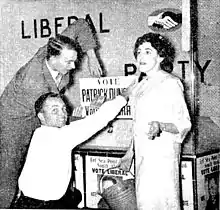Liberal Party of South Africa
The Liberal Party of South Africa was a South African political party from 1953 to 1968.
Liberal Party of South Africa | |
|---|---|
 | |
| Founded | 9 May 1953 |
| Dissolved | 1968 |
| Ideology | Liberalism |
 |
|---|
| This article is part of a series on the politics and government of South Africa |
|
|
Founding
The party was founded on 9 May 1953 at a meeting of the South African Liberal Association in Cape Town.[1] Essentially it grew out of a belief that the United Party was unable to achieve any real liberal progress in South Africa. Its establishment occurred during the "Coloured Vote" Constitutional Crisis of the 1950s, and the division of the Torch Commando on the matter of mixed membership.
Founding members of the party included (original positions in the party given):
- Margaret Ballinger (South African MP) – President of party[2]
- Alan Paton (novelist) – Vice-President[2]
- Leo Marquard – Vice President[2]
- Dr Oscar Wolheim – Chairman[2]
- Leslie Rubin (South African Senator) – Vice-Chairman[3][2]
- Peter Brown – National Chairman
- H. Selby Msimang
- Leo Kuper[4][5][6]
- Hilda Kuper[5][6]
History

For the first half of its life the Liberal Party was comparatively conservative, and saw its task primarily in terms of changing the minds of the white electorate. It leaned towards a qualified franchise.
This changed in 1959–1960. The Progressive Party, formed in 1959, occupied the political ground that the Liberal Party had occupied up till then. In 1960 the Sharpeville massacre and consequent State of Emergency, during which several Liberal party members were detained, changed the outlook of the party. Another factor was the use of simultaneous translation equipment at party congresses, which enabled black rural members to speak uninhibitedly for the first time.
In the 1960s, therefore, the Liberal Party stood unequivocally for a democratic nonracial South Africa, with "one man, one vote" as its franchise policy.
The Liberal Party also supported liberal candidates in the Transkei bantustan elections, and helped its rural members and others, especially in Natal, to resist the ethnic cleansing brought about by the implementation of apartheid. This led to the banning of several party members and leaders. One member of the Liberal Party, Eddie Daniels, spent fifteen years on Robben Island during Nelson Mandela's time there.
Contact
The newspaper Contact was closely tied to the Liberal Party, although officially it was a separate publication. The link is described by Callan as follows:
"Nevertheless, Contact has become so invariably associated in the public mind with the Liberal Party that it now seems merely academic to insist on its independent status."[1]
It may, however, be more accurate to tie the paper to Patrick Duncan than the Liberal Party.[7]
End
The party was in direct conflict with the South African government from the outset. This was due largely to the party's opposition to apartheid and criticism of the erosion of human rights by laws allowing detention without trial and arbitrary suppression of political opposition. Many of its members were placed under bans and persecuted by the South African government, which accused the party of furthering the aims of Communism.
In 1968 the South African government passed the so-called Prohibition of Improper Interference Act, which banned parties from having a multiracial membership. The Liberal Party was therefore forced to choose between disbanding or going underground, and in 1968 chose to disband.[2] The final meeting was held in The Guildhall, Durban.
See also
- Liberalism
- Contributions to liberal theory
- Liberalism worldwide
- List of liberal parties
- Liberal democracy
- Liberalism in South Africa
Notes
- Paton 1968.
- http://paton.ukzn.ac.za/Collections/liberal.aspx
- Shaw, Gerald (16 April 2002). "Obituary: Leslie Rubin". the Guardian. Retrieved 2016-06-24.
- Waters, Geoff (2015). "Liberalism interruptus: Leo Kuper and the Durban school of oppositional empirical sociology of the 1950s and 1960s". Transformation: Critical Perspectives on Southern Africa. 88 (1): 43–61. doi:10.1353/trn.2015.0020. ISSN 1726-1368.
- "University of California: In Memoriam, 1994". texts.cdlib.org. The Regents of The University of California. 1994. Retrieved 2016-06-24.
- "Hilda Kuper, 1911–92". Africa. 64 (01): 145–149. 2011. doi:10.1017/S0001972000036986. ISSN 0001-9720.
- Driver 2000, p. 35.
Bibliography
- Paton, Alan (1968). Edward Callan (ed.). The long view. London: Pall Mall. ISBN 0-269-99289-8. OL 5718565M.
- Driver, C. J. (2000). Patrick Duncan: South African and Pan-African. James Currey Publishers. ISBN 978-0-85255-773-0.
- Vigne, Randolph (1997). Liberals Against Apartheid: A History of the Liberal Party of South Africa, 1953-68. MacMillan. ISBN 978-0-312-17738-6.
| Wikimedia Commons has media related to Liberal Party of South Africa. |